by Dr. Mercola
For the past 60 years, saturated animal fats have been wrongfully accused of causing heart disease, despite mounting evidence showing that saturated fat is actually critical for optimal health while trans fat is the dietary fat causing heart disease.
Trans fat, found in margarine, vegetable shortening, and partially hydrogenated vegetable oils became widely popularized as a “healthier alternative” to saturated animal fats like butter and lard around the mid-1950’s. Its beginnings go back 100 years though, to Proctor & Gamble’s creation of Crisco in 1911.
In 1961, the American Heart Association began encouraging Americans to limit dietary fat, particularly animal fats, in order to reduce their risk of heart disease. In the decades since, despite low-fat diets becoming increasingly part of the norm, heart disease rates have soared.
It’s been a long time coming, but on November 7, 2013, the US Food and Drug Administration (FDA) announced it is now considering removing partially hydrogenated oils—the primary source of trans fats—from the list of “generally recognized as safe” (GRAS) ingredients.
The FDA will accept comments for 60 days, after which a permanent decision will be made. If finalized, the FDA’s decision means that food manufacturers can no longer use partially hydrogenated oils, i.e. trans fats, in their products without jumping through hoops to get special approval.
The comment period began November 8, 2013. I urge you to submit your comment to the FDA, telling them you want them to finalize its determination that partially hydrogenated oil is no longer general recognized as safe for use in food.
You can submit comments electronically to the FDA docket on regulations.gov. Make sure to use docket number FDA-2013-N-1317. To submit comments by mail, send to FDA at the following address. Again remember to include the agency name and docket number:
Division of Dockets Management (HFA-305)
Food and Drug Administration
5630 Fishers Lane, Rm. 1061
Rockville, MD 20852
This is the First Step Toward Eliminating Dangerous Trans Fats
This is a remarkable turnaround, and I personally could not be more pleased by this proposed change. This is the first step towards the truth, informing consumers that trans fats are a primary culprit causing premature death. The World Health Organization (WHO) has also called for the elimination of trans fats from the global food supply.
Unfortunately, the FDA is still holding fast to its ignorant view on saturated animal fats, urging people to “choose products that have the lowest combined amount of saturated fat, cholesterol and trans fat.” As I will discuss below, this advice may still cause more harm than good. You can’t expect much from this department, after spending decades spreading misinformation and creating horrible policy – they don’t want to look foolish by admitting their faults.
This is a Flash-based video and may not be viewable on mobile devices.
The Hazards of Trans Fats
Trans fats are formed when hydrogen is added to vegetable oil during food processing in order to make it solidify. This process, known as hydrogenation, makes fats less likely to spoil, so foods stay fresh longer, have a longer shelf life and also have a less greasy feel.
However, the end result is a completely unnatural fat that causes cellular dysfunction. According to the FDA, 12 percent of all processed foods contain at least one partially hydrogenated oil, aka trans fat.
But virtually any food made with or fried in partially hydrogenated oils could potentially contain trans fat, even if it’s not listed on the label. A loophole allows food manufacturers to forgo listing trans fat on the label if it contains less than half a gram per serving. In many cases, this is why some foods have such ridiculously tiny serving sizes.
If you eat a few servings, each containing half a gram of trans fat, you may actually ingest a physiologically significant amount of this deadly fat. So to truly avoid trans fats, you need to read the label and look for more than just 0 grams of trans fat.
Check the ingredients and look for partially hydrogenated oil. If the product lists this ingredient, it likely contains trans fat.
It’s important to keep your intake of trans fat as low as possible, if you eat it at all, as even low amounts can pose grave health risks. In fact, increasing your daily consumption of trans fats from 2 grams to 4.67 grams increases your risk of heart disease by 30 percent!
Research has also found that trans fats contribute to cancer, bone problems, hormonal imbalance and skin disease; infertility, difficulties in pregnancy and problems with lactation; low birth weight, growth problems, and learning disabilities in children.
Trans Fats May Be Responsible for Up to 20,000 Heart Attacks Annually
According to CDC director Thomas Frieden, an estimated 5,000 Americans die from heart disease caused by dietary trans fats each year, and another 15,000 will get heart disease as a result of eating too many trans fats. Other CDC statistics suggest that as many as 20,000 heart attacks could be avoided each year by eliminating trans fats from the food supply.
Trans fat intake has steadily decreased over the past several years, According to FDA estimates, Americans consumed an average of one gram of trans fat per day in 2012, compared to 4.6 grams per day in 2003. However, according to the Institute of Medicine, trans fat is unsafe at any level.
The Hypocrisy of the CSPI Revealed
Despite scientific evidence, there’s been a lot of controversy surrounding the potential harm of trans fats, and some organizations, such as the Center for Science in the Public Interest (CSPI) has vacillated back and forth on their recommendations. CSPI followed a similar process with aspartame, initially showing no concern but once popularized ends up changing positions. As recently reported by The Atlantic:
“In the 1980s, some scientists began to associate heart disease with saturated fats, and in response, groups such as the Center for Science in the Public Interest and the National Heart Savers Association (NHSA) began to hound manufacturers for “poisoning America … by using saturated fats,” and as a result “nearly all targeted firms responded by replacing saturated fats with trans fats,” as David Schleifer wrote in 2012 for the journal Technology and Culture. At the time, many restaurants used beef fat for frying, which groups like CSPI believed was far worse than hydrogenated oils…”
After years of campaigning and pressuring fast food restaurants and food companies to switch from (healthy) animal fat and tropical oils to (far more harmful) vegetable oils, the Center for Science in the Public Interest (CSPI) is now applauding the FDA’s decision to revoke trans fats’ GRAS status, and has removed information touting the benefits of partially hydrogenated oils from its website. Before applauding the FDA’s decision on trans fats, they were a primary group promoting this dangerous substance. For these reasons, CSPI is not high on my list of reliable resources.
Ten years ago, the Weston A Price Foundation noted the CSPI’s hypocritical stance on this issue, and questioned whether CSPI might actually be promoting the interests of the soy industry rather than public health:
“It is impossible to measure the hazards and grief that Liebman and Jacobson–the leaders of the major nutrition “activist” consumer organization–have inflicted on many millions of an unknowing public–because CSPI’s campaign was wildly successful. Thanks to CSPI, healthy traditional fats have almost completely disappeared from the food supply, replaced by manufactured trans fats known to cause many diseases.
By 1990, most fast food chains had switched to partially hydrogenated vegetable oil. In 1982, a McDonald’s meal of chicken McNuggets, large order of fries and a Danish or pie contained 2.4 grams of trans fat, out of a total of 54 grams of fat. In 1992, that same meal contained 19.2 grams trans fats, a 700 percent increase.
… Who benefits? Soy, or course. Eighty percent of all partially hydrogenated oil used in processed foods in the US comes from soy, as does 70 percent of all liquid oil. CSPI claims that its [financial] support comes from subscribers to its Nutrition Action newsletter… but in fact, in CSPI’s January, 1991 newsletter, Jacobson notes that “our effort was ultimately joined. . . by the American Soybean Association.”
FDA Does the Right Thing Once Their Backs are Against the Wall…
Most news agencies are hailing the FDA’s draft decision to revoke trans fats’ GRAS status as a sign that the agency is working (after all). But many of you may be wondering what spurred the FDA to take corrective action now, after decades of research have reiterated just how harmful trans fats are. What prompted an agency best known for corruption and conflicts of interest to act in the best interest of Americans’ health now?
Well, as it turns out, the agency’s decision comes right on the heels of a lawsuit filed by Dr. Fred Kummerow, a 99-year old heart disease researcher who has been studying heart disease for about 60 years. He first wrote about the health hazards of trans fats all the way back in 1957. Dr. Kummerow filed a citizen petition with the FDA in August of 2009 to have trans fats banned, based on the scientific evidence of harm. The agency is legally required to respond within 180 days. Four years later, no response had been issued, so Dr. Kummerow resorted to suing the agency.
The lawsuit, Kummerow vs US Food and Drug Administration et al, was filed August 9, 2013 with the Illinois Central District Court. Listed defendants include Kathleen Sebelius, Michael M Landa, US Dept of Health and Human Services, Center for Food Safety and Applied Nutrition, Margaret Hamburg, and the FDA.
According to an August 13, 2013 report by FoodNavigator.com, Dr. Kummerow “is seeking a judgment declaring that the FDA’s failure to ban the use of partially hydrogenated oils… and its delay in issuing a final response to his 2009 petition, violate the Administrative Procedure Act and the Food, Drug, and Cosmetics Act.” Dr. Kummerow also sought “an order compelling the FDA to respond to his petition and to ban partially hydrogenated oils ‘unless a complete administrative review finds new evidence for their safety.’”
Considering the fact that evidence of trans fat safety is scant to say the least, it appears the FDA had little choice but to do what it should have done years ago, which is address a well-known toxin in the food supply. It’s just too bad that they have to be sued in order to do their job. According to a report by the St. Louis Dispatch:
“When asked whether Kummerow’s lawsuit had led to the FDA’s action, a spokeswoman for the agency said she could not comment on pending litigation. But on Thursday, attorneys for the FDA filed the agency’s trans fat determination as an exhibit in Kummerow’s lawsuit, and their proposal for the ban included a mention of Kummerow’s 2009 petition. “There’s no way to know if his petition or the lawsuit was the initiating event (for the ban), but the timing is interesting,” said Diana Yates, life sciences editor at the University of Illinois.”
Chris Masterjohn, PhD has been working with Dr. Kummerow for a number of years, and I recently interviewed him about this issue, and how Dr. Kummerow’s lawsuit may have been the driving force behind the FDA’s decision to finally take action.
Chris Masterjohn, PhD, is creator and author of Cholesterol-and-Health.Com, a web site dedicated to extolling the benefits of traditional, nutrient-dense, cholesterol-rich foods and to elucidating the many fascinating roles that cholesterol plays within the body. Chris is a frequent contributor to Wise Traditions, the quarterly journal of the Weston A. Price Foundation, and is a perennial speaker at the annual Wise Traditions conference, and has published seven first-author, peer-reviewed publications.
He obtained a PhD in Nutritional Sciences from the University of Connecticut and is currently working as a Postdoctoral Research Associate at the University of Illinois where he is studying interactions between vitamins A, D, and K. The opinions he expresses in this interview represent his independent analysis and do not necessarily represent the positions of the University of Illinois.
Don’t Be Fooled—Saturated Fat is Not Associated with Increased Heart Disease Risk
As mentioned earlier, while the hazards of trans fats are now officially recognized, government health agencies and the medical establishment as a whole are still holding on to the outdated hypothesis that saturated animal fats and tropical oils are bad for your health as well. Nothing could be further from the truth, and if you care about your health you’d be wise to reconsider the advice to follow a strict low-fat diet. Mounting scientific evidence supports saturated fat as a necessary part of a heart healthy diet, and firmly debunks the myth that saturated fat promotes heart disease. For example:
- In a 1992 editorial published in the Archives of Internal Medicine, Dr. William Castelli, a former director of the Framingham Heart study, stated:
- “In Framingham, Mass., the more saturated fat one ate, the more cholesterol one ate, the more calories one ate, the lower the person’s serum cholesterol. The opposite of what… Keys et al would predict…We found that the people who ate the most cholesterol, ate the most saturated fat, ate the most calories, weighed the least and were the most physically active.”
- A 2010 meta-analysis, which pooled data from 21 studies and included nearly 348,000 adults, found no difference in the risks of heart disease and stroke between people with the lowest and highest intakes of saturated fat.
- Another 2010 study published in the American Journal of Clinical Nutrition found that a reduction in saturated fat intake must be evaluated in the context of replacement by other macronutrients, such as carbohydrates.
When you replace saturated fat with a higher carbohydrate intake, particularly refined carbohydrate, you exacerbate insulin resistance and obesity, increase triglycerides and small LDL particles, and reduce beneficial HDL cholesterol. The authors state that dietary efforts to improve your cardiovascular disease risk should primarily emphasize the limitation of refined carbohydrate intake, and weight reduction.
What Makes for a Heart Healthy Diet?
It’s important to realize that saturated fats from animal and vegetable sources provide a number of important health benefits, and your body requires them for the proper function of your:
- Cell membranes
- Heart
- Bones (to assimilate calcium)
- Liver
- Lungs
- Hormones
- Immune system
- Satiety (reducing hunger)
- Genetic regulation
To prevent heart disease it’s critical to address your insulin- and leptin resistance, which is the result of eating a diet too high in sugars and grains, not fat. As decades of research has shown, dietary fat has very little to do with your heart disease risk—with the exception of trans fats from partially hydrogenated vegetable oils, which have been linked to increased heart disease risk, even in small amounts. So, to safely and effectively reverse insulin and leptin resistance, thereby lowering your heart disease risk, you need to:
- Avoid sugar, fructose, grains, and processed foods
- Eat a healthful diet of whole foods, ideally organic, and replace the grain carbs with:
- Large amounts of vegetables
- Low-to-moderate amount of high quality protein (think organically raised, pastured animals)
- As much highly quality healthful fat as you want (saturated and monosaturated from animal- and tropical oil sources). Most people actually need upwards of 50-70 percent fats in their diet for optimal health—a far cry from the 10 percent currently recommended.
One of the most important fats your body needs for optimal health is animal-based omega-3. Deficiency in this essential fat can cause or contribute to very serious health problems, both mental and physical, and may be a significant underlying factor of up to 96,000 premature deaths each year. For more information about omega-3′s and the best sources of this fat, please review this previous article. Besides animal-based omega-3 fats, other sources of healthful fats to add to your diet include:
- Avocados
- Butter made from raw grass-fed organic milk
- Raw dairy
- Organic pastured egg yolks
- Coconuts and coconut oil
- Unheated organic nut oils
- Raw nuts, such as, almonds, pecans, macadamia, and seeds
- Grass-fed meats
Healthy Fat Tips to Live By
The most effective prevention strategy against heart disease you’ll likely ever find is your diet—the foods you do and do not eat every day. For example, a Mediterranean-style diet has been shown to be three times more effective than statin drugs at reducing cardiovascular mortality. A Mediterranean-style diet is basically a whole-food diet. And that is indeed key for any healthy diet. The answer to your heart disease concerns is to EAT REAL FOOD. This change alone will dramatically reduce the amount of refined sugar and processed fructose in your diet. It will also address the issue of healthful versus harmful fats in your diet. Besides eliminating processed foods, the following tips can help ensure you’re eating the right fats for your health:
- Use organic butter made from raw grass-fed milk instead of margarines and vegetable oil spreads.
- Use coconut oil for cooking. It is far superior to any other cooking oil and is loaded with health benefits.
- Use olive oil COLD, drizzled over salad or fish, for example. It is not an ideal cooking oil as it is easily damaged by heat.
- Following my nutrition plan will teach you to focus on healthy whole foods instead of processed junk food.
- To round out your healthy fat intake, be sure to eat raw fats, such as those from avocados, raw dairy products, and olive oil, and also take a high-quality source of animal-based omega-3 fat, such as krill oil.
Read the full article here: http://articles.mercola.com/sites/articles/archive/2013/11/20/trans-fats-hydrogenated-oil.aspx



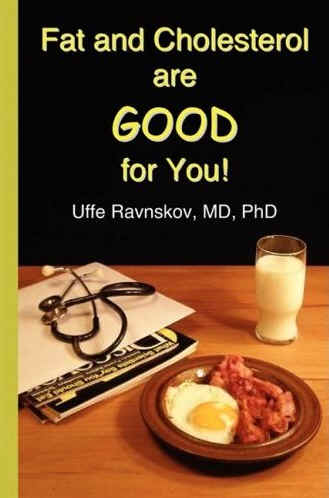
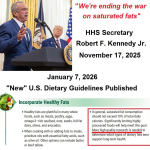 HHS Secretary Kennedy Breaks His Promise: "War on Saturated Fat" Kept in Tact with New U.S. Dietary Guidelines
HHS Secretary Kennedy Breaks His Promise: "War on Saturated Fat" Kept in Tact with New U.S. Dietary Guidelines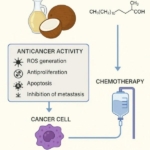 Research Continues to Show Virgin Coconut Oil's Effectiveness in Treating Cancer
Research Continues to Show Virgin Coconut Oil's Effectiveness in Treating Cancer Coconut Oil Continues to Benefit Alzheimer's Patients over Drugs as Studies Continue for Neurological Benefits
Coconut Oil Continues to Benefit Alzheimer's Patients over Drugs as Studies Continue for Neurological Benefits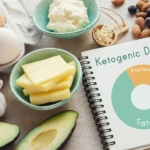 How the Simple High-Fat Low-Carb Ketogenic Diet Continues to Change People's Lives
How the Simple High-Fat Low-Carb Ketogenic Diet Continues to Change People's Lives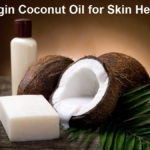 New Studies Continue to Show that Coconut Oil is the Best Oil for Treating Skin Conditions and Maintaining Healthy Skin and Teeth
New Studies Continue to Show that Coconut Oil is the Best Oil for Treating Skin Conditions and Maintaining Healthy Skin and Teeth